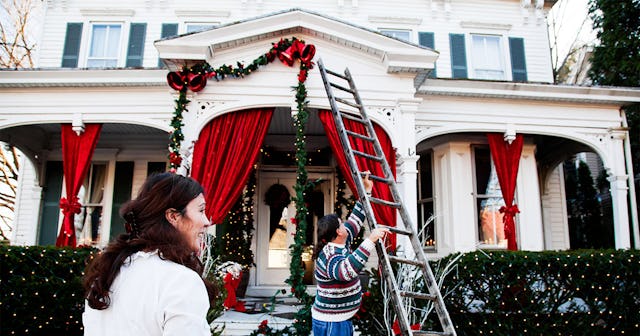9 Pro Tips To Keep Your Family Regulated During The Holiday Hustle And Bustle

Dysregulation has become a buzz-worth parenting word. It’s defined as “a poor ability to manage emotional responses or to keep them within an acceptable range of typical emotional reactions.” Emotional reactions that occur during a state of dysregulation include “sadness, anger, irritability, and frustration.” Sound familiar?
The holidays are prime time for dysregulation — for both children and their parents. Between all the sugar, the lack of rest, and the hustle and bustle, it’s very easy for children (and adults) to become overwhelmed. We go into sensory overload, our blood sugar is off-balance, and we would really like a break. When we walk into the holiday season without a plan, the “crash and burn” is even more likely to happen.
Here’s how to keep everyone as regulated as possible this season, including tips from Dr. Jennifer Wolkin, a neuropsychologist.
Parents need to practice self-care.
Dr. Jen tells Scary Mommy that when we neglect self-care, we stress out our nervous systems and cause a “buildup of stress will cause potential irritation and agitation.” If the adult is dysregulated, the child will likely follow suit, creating a “vicious cycle.” A regulated parent is more likely to have regulated children, so Dr. Jen says “help your kids by helping yourself!” Make a list of self-care activities, and then make sure you’re practicing them regularly.
Have an exit strategy.
Long before you arrive at your holiday gathering, decide as a family when you plan to leave. It might be that you leave when someone needs a nap, when a family member makes an inappropriate comment, or when it’s close to dinnertime. You can also create a word or hand signal that any family can use that means it’s time to go, and make sure you honor it.
Pack healthy snacks.
Holiday food is often heavy on the carbs and light on the protein and healthy fats. We need balanced meals and snacks that keep us full and our blood sugar steady. Carbohydrates spike and drop blood sugar, putting us on a roller coaster of hunger and mood swings. Make sure to carry protein and healthy fat snacks with your family, such as protein bars, deli meat roll-ups, and nut butter cups (and spoons).
Practice manners.
Opening gifts can be awkward for kids and adults, mostly because kids can forget to say “thank you” and adults insist they do so in the moment. There’s also an expectation that kids should perform for adults. In order to make the flow of gift receiving and giving better for all, practice these scenarios with your kids before you attend your gathering. Remind them that even if they already have the gift or don’t like it, the correct response is a simple “thank you.” You will happily discuss the gift later, in the privacy of your own home or car. . Issue any reminders that are family norms, like if Aunt Judy doesn’t allow shoes to be worn in the house.
Drink water.
When we’re on the go, it’s easy to forget to drink enough water. In my family, we carry large, re-useable water bottles (color coded, because there are six of us) everywhere we go.
Plan down times.
You — and your family — need breaks. Put plenty of down time into your family’s holiday schedule, at regular intervals. Ideally, these would be during any typical nap times for younger kids. If you’re staying with someone, let them know that your crew is going to take a rest for an hour or two—and when. Don’t be afraid to tell your children that they can let you know if they need a break. You can always go for a walk, curl up and watch a movie, or play a game in another room. On the other hand, some gross motor activity may be just what your child (or you) need. Dr. Jen says, “This can include letting them get outside for some vigorous play so that they’ve expended themselves before a family gathering.”
Know when to say no.
Not every holiday invitation requires you to say yes. As a family, decide what holiday events you want to attend and which ones you’d like to decline. If an event means dealing with relentlessly rude relatives or requires a drive that is simply too far for your family, simply say, “Thank you for thinking of us, but we cannot attend this year.” You do not have to explain why.
Take tools that help.
Noise-cancelling headphones, cozy clothing, or a familiar snack, toy, or blanket can go a long way in helping a family member who is prone to holiday dysregulation. If the matching Christmas PJs are too tight or itchy, don’t force your child to wear them. Let them wear the mismatched, too big flannel jammies that they love.
Make drives fun and relaxing.
When traveling to and from holiday events, ask how you can make the drive as pleasant and calming as possible. This might mean putting on a favorite movie, enjoying (protein, remember?) snacks in the car, and wearing comfy clothes or taking along blankets. The drive can serve as the perfect wind-down time. Right before you arrive at your destination, review any rules, exit strategies, and manners with your kids.
This article was originally published on